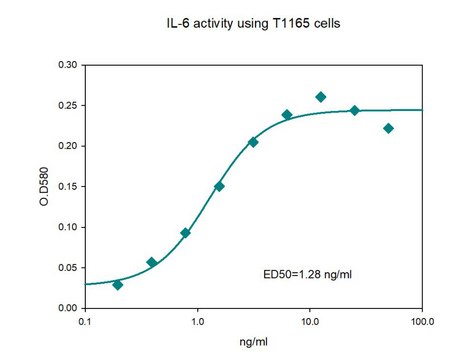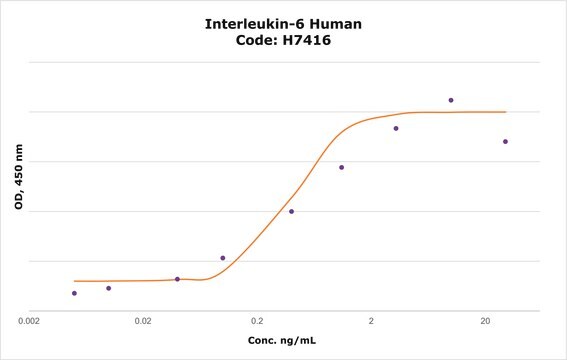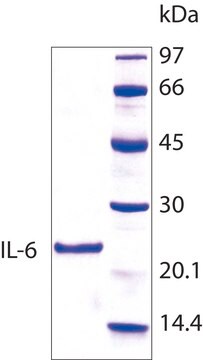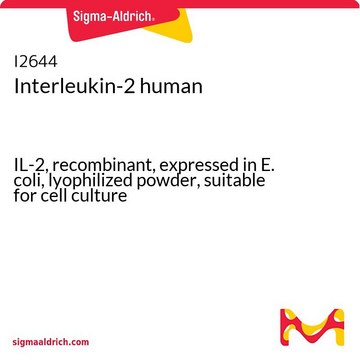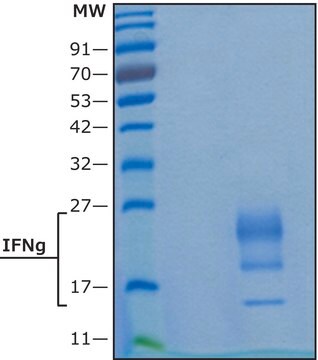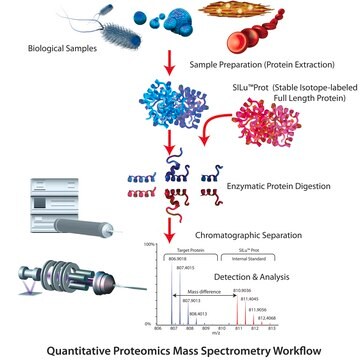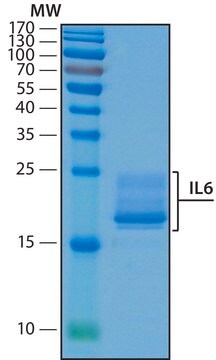407652
Interleukin-6, Human, Recombinant, E. coli
Synonym(s):
BSF-2, IFN-beta-2, IFNB2, rhIL-6
Sign Into View Organizational & Contract Pricing
All Photos(2)
About This Item
UNSPSC Code:
12352202
NACRES:
NA.77
Recommended Products
Assay
≥95% (SDS-PAGE)
Quality Level
form
lyophilized
manufacturer/tradename
Calbiochem®
storage condition
OK to freeze
technique(s)
cell culture | mammalian: suitable
impurities
≤1.0 EU/μg Endotoxin (EU/μg IL-6)
UniProt accession no.
shipped in
ambient
storage temp.
−70°C
Gene Information
human ... IL6(3569)
General description
Research area: Immunology and Cytokines
Human sequence IL-6 is active in murine cells.1 µg is equivalent to 7.0 x 103 WHO units. 8-20 pg/ml as measured in a cell proliferation assay with a factor-dependent murine plasmacytoma cell line, B9.
Human sequence IL-6 is active in murine cells.1 µg is equivalent to 7.0 x 103 WHO units. 8-20 pg/ml as measured in a cell proliferation assay with a factor-dependent murine plasmacytoma cell line, B9.
Application
Interleukin-6has been used:
- to study IL-6 effects on lung cancer-derived mesenchymal stromalcells (MSCs) and to test the ability of statins to block these effects.
- toinvestigate the role of IL-6 in the development of coronary artery spasm (CAS).
- to study the effects of IL-6 on the bioactivity of therapeutic interferon (IFN)variants.
Biochem/physiol Actions
Interleukin-6 (IL-6) is a prototypic pleiotropic, pro-inflammatory cytokine that is expressed in response to injury, inflammation, and infection.(5) IL-6 triggers the activation of three distinct pathways: signal transducer and activator of transcription 3 (STAT-3), extracellular signal-regulated kinase 1 and 2 (Erk1/2), and protein kinase b/protein kinase b-alpha (Akt). Consequently, this activation leads to the upregulation of numerous genes that impact essential cellular processes including survival, proliferation, differentiation, osteogenesis/osteolysis, angiogenesis, and immune modulation. It stimulates the production of acute-phase proteins by hepatocytes. IL-6 is also known to induce skeletal muscle protein breakdown. Induces growth and differentiation of B cells, T cells, and hepatocytes. Stimulates growth and inhibits constitutive, protein synthesis-independent apoptosis of murine B cell hybridoma 7TD1. IL-6 is also considered as a potential marker of adipocyte differentiation. Interleukin-6 is a protein produced by a variety of cell types including T-lymphocytes, monocytes, diploid fibroblasts, hepatocytes, cardiac myxomas, certain cervical cancer cells, bladder cell carcinomas, vascular endothelial cells, and human myelomas. It has a variety of biological effects and does not show a high degree of species specificity.
Warning
Toxicity: Standard Handling (A)
Physical form
Carrier free.
Reconstitution
Following reconstitution, aliquot and freeze (-70°C). Stock solutions are stable for up to 3 months at -70°C. Avoid freeze/thaw cycles of solutions.
Reconstitute to 0.1-1.0 mg/ml in 100 mM acetic acid.
Other Notes
Vicennati, V., et al. 2002. Int. J. Obes. Relat. Metab. Disord.26, 9.
Vallieres, L., and Rivest, S. 1999. Endocrinology140, 3890.
Goodman, M.N. 1994. Proc. Soc. Exp. Biol. Med. 205, 182.
Liu, J., et al. 1994. Cell Immunol.155, 229.
Van Snick, J. 1990. Annu. Rev. Immunol.8, 253.
Vallieres, L., and Rivest, S. 1999. Endocrinology140, 3890.
Goodman, M.N. 1994. Proc. Soc. Exp. Biol. Med. 205, 182.
Liu, J., et al. 1994. Cell Immunol.155, 229.
Van Snick, J. 1990. Annu. Rev. Immunol.8, 253.
Legal Information
CALBIOCHEM is a registered trademark of Merck KGaA, Darmstadt, Germany
Storage Class Code
11 - Combustible Solids
WGK
WGK 1
Flash Point(F)
Not applicable
Flash Point(C)
Not applicable
Certificates of Analysis (COA)
Search for Certificates of Analysis (COA) by entering the products Lot/Batch Number. Lot and Batch Numbers can be found on a product’s label following the words ‘Lot’ or ‘Batch’.
Already Own This Product?
Find documentation for the products that you have recently purchased in the Document Library.
Yen-Kuang Lin et al.
Oxidative medicine and cellular longevity, 2022, 9964689-9964689 (2022-02-01)
Apolipoprotein (a)/lipoprotein(a) (Lp(a)), a major carrier of oxidized phospholipids, and α7-nicotinic acetylcholine receptor (α7-nAChR) may play an important role in the development of coronary artery spasm (CAS). In CAS, the association between Lp(a) and the α7-nAChR-modulated inflammatory macrophage polarization and
Our team of scientists has experience in all areas of research including Life Science, Material Science, Chemical Synthesis, Chromatography, Analytical and many others.
Contact Technical Service
